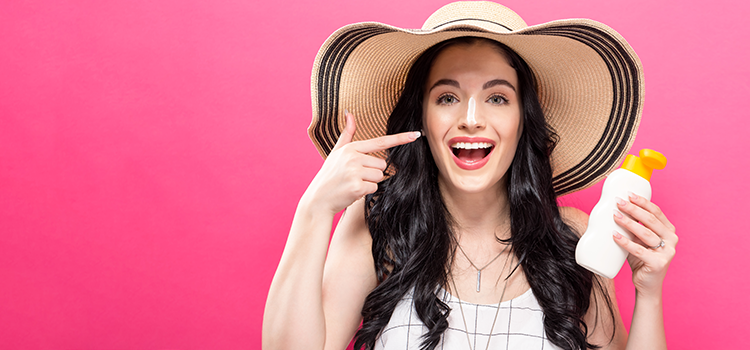When shopping for sunscreen, it can prove to be understandably overwhelming. The options are seemingly limitless, as are the potential ingredients, and the numbers on the labels have started to balloon beyond a triple-digit threshold.
But beyond the need for protection from the sun while at the pool or beach, sunscreen is essential for preventing wrinkles and sunspots – especially on your face – during everyday activities like driving, walking the dog, and gardening, too.
So here, we hope to demystify some of the overwhelming options and debunk misinformation surrounding sun protection.
Does a bigger SPF number equate to better protection?
According to the American Academy of Dermatology, it does not. The recommended level is SPF 30 – and anything higher doesn’t necessarily offer any more protection. In fact, the FDA has recently recommended changing the sunscreen labeling where the highest level available will be 50+.
What does the SPF number mean?
For SPF 30, for example, the number means that your face would take 30 times longer to burn than not wearing any sunscreen. So if it takes one minute to burn without sunscreen, it would take 30 minutes to burn after applying the recommended amount of SPF 30.
Should different skin tones wear different levels of SPF?
Everyone should wear sunscreen, since the sun causes skin cancer, damage and aging for all skin types. So, the Academy does not recommend different levels according to skin tone.
What are UVA and UVB rays and how can they affect my face?
UVA rays prematurely age your skin, causing wrinkling and age spots, UVB rays burn your skin – and too much exposure to either can cause skin cancer. So, the best sunscreen offers protection from all UV light.
Are there sunscreens for your face that you can apply only once a day?
Simply put: no. Sunscreen needs to be reapplied every two to three hours, regardless of brand or type – and despite product claims to the contrary.
Are drinkable SPFs as effective as topical sunscreen?
Again, no. While products that allow you to drink your SPF protection have been making headlines, dermatologists are dubious at best.
Is SPF clothing effective?
It is. SPF clothing is 100 percent effective in preventing the sun from penetrating through to your skin.
Should you reapply ‘waterproof’ sunscreen after going in the water?
It is now actually illegal to call a sunscreen ‘waterproof’, according to new FDA regulations, because it implies that consumers are protected indefinitely – which is patently false. New labeling can make assertions that a product is water-resistant and should specify how long that resistance will last.
If your face isn’t visibly burned, are you safe?
Skin damage and aging can affect your face, whether your face noticeable changes color or not. And though a burn is worse for your skin, both burns and chronic sun exposure in the form of a tan can leave lasting negative effects.
While we’re proud to offer some of the most advanced and effective age-defying procedures and products on the market, we believe the adage that an ‘ounce of prevention is worth a pound of cure.’ So, should you have any questions or concerns about how to protect your skin this summer, give the experienced professionals at Youthful Reflections a call today at (615) 942-8016.

